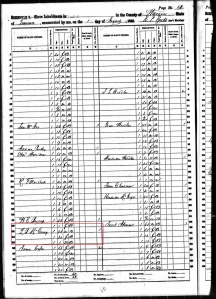Slave ownership is sticky and not in good way. I wanted to know what happened to Matthew McCrary’s slaves when he died (see past post). I haven’t found a document that told of the final disposition of his slaves in the court records yet. I did find a record that stated that the intention of the heirs was to sell the land and investments, but to not sell the slaves. My assumption has been that they most likely divided the slaves among Matthew’s wife Mary and his 7 living children: Louisa, Reason, Irvin/Irwin, Thomas, Matthew, Lyman and America. This led me to the 1850 and 1860 slave schedules to support or dispute my theory. I found that Louisa (Matthew’s oldest child) and her husband Thomas Davis are the only ones who owned slaves in 1850 and appear to have the same slaves in 1860 with one additional child. None of the other heirs owned any slaves in 1850, but by 1860, all of them owned slaves. It is likely that some/most of the slaves were inherited from Matthew’s estate. Either way, whether they inherited or not, what it does confirm is that they all participated in the institution of slave ownership. There was not one dissenter who chose not to own slaves. Yes, slavery is very sticky.
This begs all sort of questions and I may or may not ever find out the answers to:
- Why did they have these slaves?
- Did they use them for farm labor or house slaves?
- Did they consider their feelings and desires when making decisions?
- When some of the family moved to Arkansas and Tennessee prior to 1860, did they honor family units or split families up?
- Did they believe in the institution of slavery or were they just too morally lazy to take a stand?
- Were they non violent owners or were they cruel? It seems ridiculous to say kind and owner in the same sentence.
So, I am taking a small break from this research – quite frankly it makes me profoundly sad. I will return, but I need something to pick up my spirits…so moving on to Civil War doctors and nurses. [Picture smiley face]



Ugh. Such hard stuff. Makes history very real. And it points out that we’re all descended from such a mix of ancestors – most of whom never knew each other and wouldn’t have necessarily liked each other! We wouldn’t have liked them all either.
No, we definitely wouldn’t have liked all of them!
Rachelle, another great blog post. The questions you ask seem to stem from a desire to see something good in the people who used slavery and slaves in their day to day lives. It is hard to fathom why somone could truly not see how horrific the practice was, but … we are looking with modern– and dare I say Western/Northern eyes. Discovering our past puts us in the position, I think, to acknowledge the truth of what we’ve found. I’m glad it doesn’t put us in a position to embrace or applaud what we find. Keep up the sleuthing and the writing.
I don’t know if I would say I was trying to find something “good” in the McCrary’s as slave owners. I believe that they were like most people neither all good, nor all bad. I recognize that they were products of their culture that not only condoned slavery, but found biblical justification for it. They saw it as a way to achieve wealth and status. Matthew McCrary’s sons were able to go to law school and medical school because he had slaves back on the farm doing the work. They were all invested in the institution and what it gave them. No, what I think I wish to know is how much of their of their humanity remained within that institution. Did they like some of their slaves? Did they ever laugh with them? Or did they always objectify them? Did the McCrary’s understand that they loved their children and would not want to be separated from them? Did they care? I suspect that holding on to one’s humanity in a slave culture is bound to be challenged….like when they ran away. And they did – according to the 1860 slave schedule 3 of the slaves were fugitives. What did they do then? Ads in the papers that would result in slave hunters going after them? No..I am not liking the McCrary’s this week at all.
I’ve come across this today and just happened to find your page while searching for McCrary’s: “Lawrence County, Alabama Newspaper Clippings from The Moulton Democrat” by Robin Sterling, p. 23
The Moulton Democrat, 6 Dec 1855 (Volume 1, No. 47)
“Administrator’s sale of property belonging to the estate of Matthew McCrary, deceased, of seventeen likely Negroes, men, women, and children, none over thirty-six years old. The Negroes, are a very superior lot of slaves. Also, seven horses and mules, about 30 pork hogs, stock hogs, two yokes of oxen, cattle, and sheep, farming utensils, a new and superior gin head, thresher, and fan, household and kitchen furniture, fodder, and oats, one second hand buggy, one ox wagon, &c., by J.P. [I.P.] and L.B. McCrary, administrators.”
According to this article, “The Negroes are a very superior lot of slaves.” Suggests they were well cared for.
Love your e-mail address from one “joy” to another! Regarding the state of the slaves the McCrary owned, I am afraid I am not quite so charitable about the “goodness” of McCrary’s caring for their slaves. They were property and an investment and keeping them healthy made only good business sense. They could be sold, separated from their families and severely punished for acting independently. I try to put it in the context of the times, but I still find it deplorable. No doubt we will be judged for our actions in our own era as well…yikes!